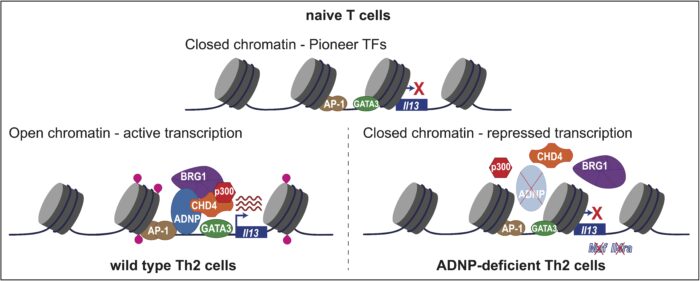CRISPR screening identifies new role for the protein ADNP in activating type-2 immune responses in allergies

Allergy and asthma are the result of inappropriate type-2 immune responses. The key orchestrators of these responses are type-2 innate lymphoid cells (ILC2s) and adaptive T helper 2 (Th2) cells, which produce the cytokines interleukin-4 (IL-4), IL-5 and IL-13. These cytokines act as messengers to induce the widespread activation of immune responses.
Researchers in Andrew McKenzie’s group in the LMB’s PNAC Division have now discovered that the activity-dependent neuroprotector homeobox protein (ADNP) is required for effective IL-13 production by Th2 cells, and is crucial for immune responses to an allergen. ADNP is a protein which has previously been associated with neurological and developmental disorder but this is the first time that ADNP has been studied in the context of the immune system.
Led by Ana Ferreira and Aydan Szeto, both postdoctoral researchers in Andrew’s group, the team used high-throughput CRISPR screening to simultaneously assay 1131 transcription factor genes for their involvement in IL-13 production in Th2 cells. This allowed them to identify ADNP as a new regulator of IL-13 expression. This was further confirmed using in vivo mouse models of lung allergy associated to single cell expression analysis.
The molecular mechanism by which ADNP regulates IL-13 expression was determined using a combination of mass spectrometry, chromatin immunoprecipitation followed by sequencing, and transposase-accessible chromatin sequencing. This revealed that ADNP performs a previously unappreciated role in gene activation, where it is required for the recruitment of other proteins to prepare the IL-13 gene locus for transcription. Without ADNP, the gene locus is ‘closed’ and the gene is not transcribed, meaning the chromatin has a status of an unspecialised T cell rather than a Th2 cell and the immune response to the allergen is restricted.
This finding highlights a previously unappreciated regulator of immune gene activation and is the first study to directly demonstrate a role for ADNP in IL-13 production. Looking forward, this allows for future research on the role of ADNP in human allergic disease. Clinically, this is important as 20% of the world population is affected by allergic diseases, including asthma.
The work was funded by UKRI MRC, the Wellcome Trust and the Croucher Foundation.
Further references
Neuroprotective protein ADNP-dependent histone remodeling complex promotes T helper 2 immune cell differentiation. Ferreira, ACF., Szeto, ACH., Clark, PA., Crisp, A., Kozik, P., Jolin, HE., McKenzie, ANJ. Immunity
Andrew’s group page
Previous Insight on Research articles
Integrin-mediated T helper 2 cell clustering revealed as key step and potential therapeutic target in allergic immune response
Blocking action of intestinal immune cell enhances the immune response to colorectal cancer